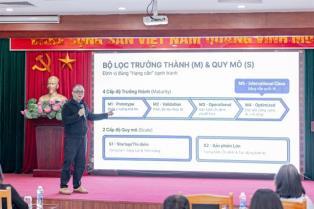Artificial intelligence (AI) is reshaping how developers across Southeast Asia, including Việt Nam, build, learn, and collaborate, experts said.

HCM CITY — Artificial Intelligence (AI) is reshaping how developers across Southeast Asia, including Việt Nam, build, learn, and collaborate, experts said.
Idan Zalzberg, chief technology officer at Agoda, said: “What began as a way to speed up tasks like writing, testing, or debugging code has grown into a broader shift in how software is built. Today, AI helps teams move faster, learn continuously, and solve problems in new ways.
“In this region, AI use is mainstream but still uneven. Developers are approaching AI with pragmatism – accelerating work, maintaining quality, and experimenting thoughtfully rather than replacing skill or judgment. The real opportunity lies in supporting this ground-up maturity with structured practices and responsible experimentation, turning high adoption into consistent, lasting capability,” he said.
A new study recently released by digital travel platform Agoda and conducted in partnership with Macramé Consulting shows that AI adoption is high among software developers in Southeast Asia and India, but its usage is still maturing. Developers use it pragmatically to accelerate work without compromising quality, while organisations face the challenge of putting in place the policies, practices, and frameworks needed to support the next phase of AI evolution in the region.
Across Southeast Asia and India, AI has become a daily companion in developer workflows. Up to 95 per cent of developers use AI weekly, and 56 per cent always keep an AI assistant open. Productivity drives adoption, with 80 per cent citing speed and automation as their main motivation. Engineers are seeing tangible results, with 37 per cent saving four to six hours per week.
Yet AI remains primarily a productivity tool rather than a creative partner. Only 22 per cent use it to solve unfamiliar problems, and less than half believe it can perform at the level of a mid-level engineer.
While 94 per cent rely on AI for code generation, usage drops for downstream tasks such as documentation, testing, and deployment. This highlights a gap between use and reliability, pointing to the need for more consistent, dependable results.
Notably, Việt Nam’s developer community stands out in its use of AI at each step in the build-and-test cycle, with 94.3 per cent of developers using it when writing code, 70.0 per cent for documentation, and 62.9 per cent for code review.
Respondents in Việt Nam were also outliers in their multi-tool approach to AI, with 41 per cent using Claude Code in the past six months - the highest share among all markets - extending well beyond Copilot and ChatGPT dominance.
Oversight and verification are increasingly embedded in daily AI workflows. 79 per cent of developers cite inconsistent or unreliable outputs as the primary barrier to broader AI use. To maintain quality, 67 per cent review all AI-generated code before merging, and 70 per cent routinely rework outputs to ensure correctness.
With adoption now near universal, the focus has shifted to how developers use AI responsibly and effectively. Most developers are self-taught, 71 per cent learning through tutorials, side projects, or online communities, while only 28 per cent receive employer-led training. Access to structured programmes also varies by market: developers in Singapore are almost twice as likely as those in Việt Nam to have formal AI training programmes.
The study was commissioned by Agoda and conducted in partnership with Macramé Consulting. — VNS
- Tags
- AI;Agoda



